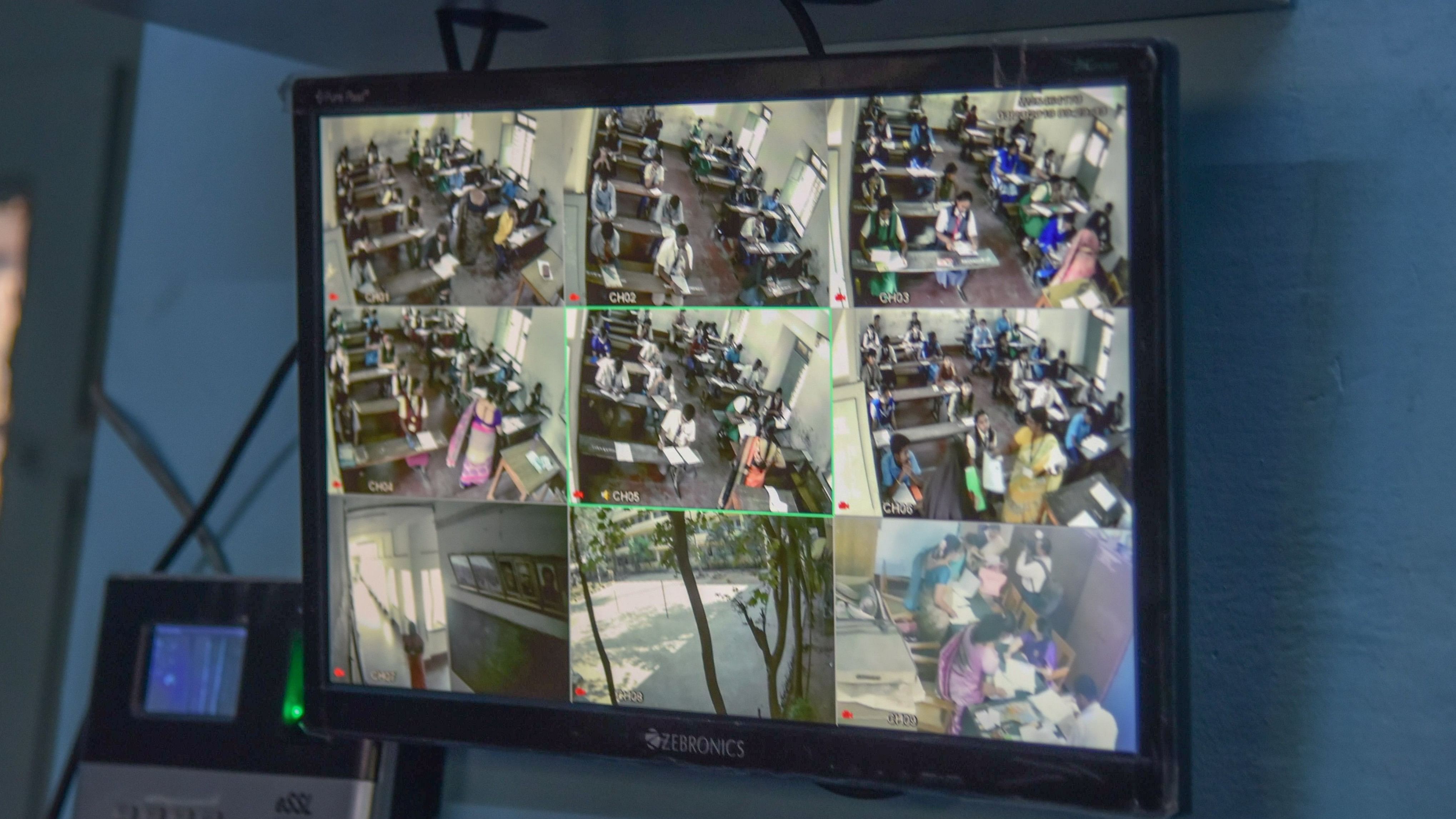
The SSLC exams this year were monitored by officials via CCTVs.
Credit: DH File Photo
The actual results of the Secondary School Leaving Certificate (SSLC) exams this year have not just stunned the state, but also questioned the sanctity of exams held all these years. They proved that the learning levels and quality of teaching were poor.
The actual results of SSLC recorded this year was as low as 54 per cent, and to boost the pass percentage (to 73.7), the Karnataka School Examination and Assessment Board followed a normalisation process and the qualifying marks for granting grace marks was reduced from 35 per cent to 25 per cent.
Twenty marks were given as grace marks. The department came under severe criticism for the makeshift solution to the problem of poor results this year. Chief Minister Siddaramaiah, upset with the award of grace marks, pulled up officials and announced scrapping of grace marks from next year.
However, officials of the Board and the department attributed this ‘anomaly’ to the new system introduced during this year. To avoid malpractice incidents, the Board had made it mandatory to web stream the exams and the live streaming was monitored at the office of the deputy commissioner in each district.
As explained by officials, this stringent measure did not give room for malpractices. Hence, they decided to award grace marks. Criticising this, stakeholders said, “These were the actual results and this revealed that students used to sail through the exams by illegal means all these years.”
V P Niranjanaradhya, development educationist, said, “We are all worried about the way the department officials are portraying the awarding of grace marks as an achievement. But actually, these results reveal the learning gap and it is a matter of shame.”
Highlighting the shortage of teachers at state board schools, both government and private, Niranjanaradhya said, “The quality of education at the primary level is suffering and going down every year. We have at least 35,000 guest teachers and most of our schools lack basic infrastructure. Unless the quality of education is improved, this decision by the Board to award grace marks will be considered as justifying the injustice and it is against the Constitution.”
Several stakeholders even questioned the need for conducting exams if they were passing students by giving grace marks. Calling this an irresponsible and widely unjustified action that undermines the integrity of the exam system, Supreeth B R, principal of Oxford Group of Institutions, Bengaluru, said, “The decision to grant grace marks raises questions about the necessity of conducting exams in the first place. If the authorities were so passionate about awarding grace marks, one must ponder over the rationale behind subjecting students to the stress and pressure of exams.”
“Suddenly resorting to awarding grace marks as a panacea for administrative shortcomings sets a dangerous precedent and erodes the credibility of the exam process. It is injustice to students. It definitely undermines the efforts of hardworking students by devaluating the significance of academic achievement,” he said.
Minister for School Education and Literacy pointed to the Covid-19 pandemic and said, “In order to protect the sanctity of the exams, we have taken some decisions and we were expecting a fall. First of all, children who wrote SSLC this year were in class 6 and 7 during the pandemic. Obviously, the quality of teaching has fallen”.
The decision to award grace was questioned by various stakeholders including parents and school management representatives. The school management representatives even petitioned the chief minister recently, urging him to convene a meeting of stakeholders to discuss the results.
The Karnataka Private School Managements, Teaching and Non Teaching Staff Co-Ordination Committee (KPMTCC) demanded that the chief minister to implement the 2019 amendments to Right to Education Act, where there is a provision to conduct public exams at class 5 and 8 level and also to detain kids
D Shashi Kumar, convener of KPMTCC, said, “Implementation of RTE amendments will bring about accountability among kids. If there is no accountability, they will not take learning seriously.”
He called for strengthening pre-primary education. “Introduction of pre-primary level at government schools and revising textbooks of class 1 to 4 is the need of the hour to improve quality,” he said.